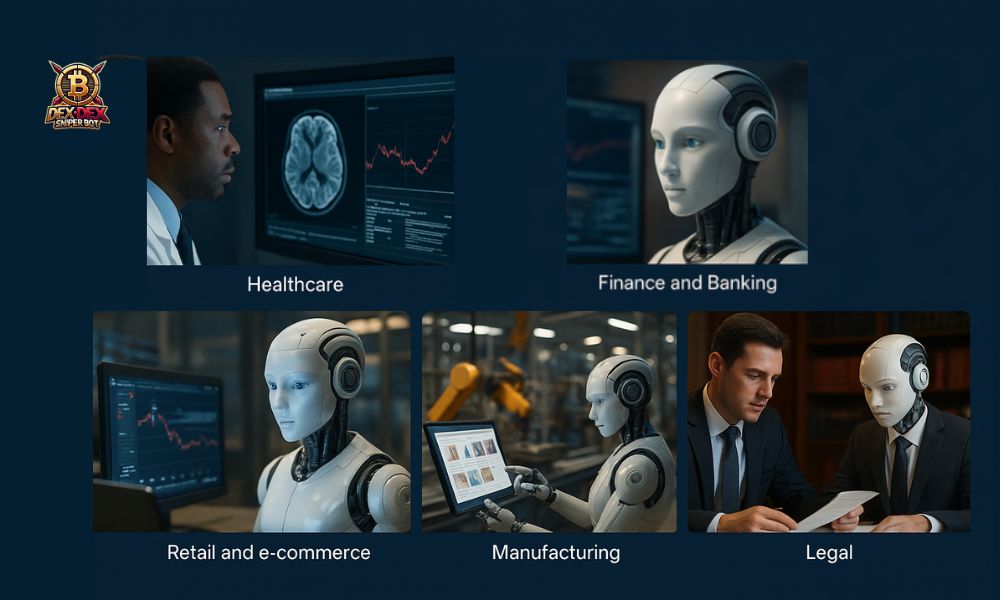A Vertical AI agent is fundamentally reshaping how businesses operate in the digital era. This specific form of artificial intelligence is meticulously designed and trained for a singular domain or industry. Unlike its general-purpose counterparts, it focuses not on answering everything, but on solving complex, industry-specific problems with exceptional accuracy, thereby providing a powerful competitive advantage.

Table of Contents
Understanding the Vertical AI agent correctly
To clearly grasp the concept of a Vertical AI agent, it’s helpful to compare it with general AI.
General AI: Think of this as a general practitioner in medicine. They have a wide base of knowledge across many fields but lack deep expertise in any single one. They can answer questions about history, science, write a poem, or summarize a document. However, when faced with a complex, technical business problem, they may lack the specialized knowledge and contextual data required.
Vertical AI agent: In contrast, this is like a specialist doctor, such as a cardiologist. They may not know much about dermatology, but they are a leading expert in their own field. A Vertical AI agent is trained on a massive, highly specific dataset from a single industry, such as finance, healthcare, law, or manufacturing. This allows it to understand the unique terminology, processes, and nuances of that sector to deliver analyses, predictions, and decisions with extremely high precision.
The core difference lies in the depth of knowledge. While general AI offers breadth, a Vertical AI agent provides depth, making it an indispensable tool for businesses seeking to solve highly specific challenges.
The outstanding benefits of a Vertical AI agent
Implementing a specialized AI assistant is not just a technological trend; it’s a strategic decision that delivers tangible benefits to a business.
High specialization and superior accuracy
Because it is trained on data from a single industry, a Vertical AI agent can comprehend complex jargon, regulations, and business workflows. This significantly reduces the errors that general AI models often make when handling specialized requests. For instance, a healthcare AI can read an X-ray with an accuracy that is comparable to, or even exceeds, that of human experts.
Optimization of specific business processes
Every industry has its unique processes. A Vertical AI agent is designed to automate and optimize these exact workflows. In the financial sector, it can automate credit risk analysis. In retail, it helps to intelligently optimize the supply chain and manage inventory.
Enhanced competitive advantage
The business with more efficient and specialized technology will always have an edge over its competitors. By using a Vertical AI agent to make faster, more accurate decisions and provide better-personalized customer service, a company can create a significant gap between itself and the general market.
Security and compliance
Industries like healthcare and finance are subject to strict data security regulations (such as HIPAA or GDPR). A Vertical AI agent can be built and deployed in a controlled environment, ensuring that sensitive customer and company data is always protected and compliant with industry-specific legal requirements.
Practical applications of the Vertical AI agent in various industries

Theory is of little value without real-world application. Here are some prime examples of how the Vertical AI agent is changing the game:
Healthcare: AI assistants specialized in analyzing medical images (MRIs, CT scans) to detect early signs of tumors or diseases. AI is also used to analyze patient records and recommend personalized treatment plans based on genetic data and medical history.
Finance and Banking: Deeply specialized AI systems help detect fraudulent credit card transactions in real-time, accurately assess customer credit scores, and provide automated investment advice based on risk appetite and financial goals.
Retail and E-commerce: A Vertical AI agent can analyze shopping behavior to offer hyper-personalized product suggestions, forecast market demand to optimize inventory levels, and automatically adjust pricing to remain competitive.
Manufacturing: In smart factories, specialized AI monitors machine performance to predict when maintenance is needed, preventing unexpected breakdowns. It also uses computer vision to inspect product quality on the assembly line with speed and accuracy far beyond human capability.
Legal: AI assistants help lawyers review thousands of legal documents in minutes to find critical information, supporting research and preparation for court cases.
In summary, the Vertical AI agent is more than just a tech trend; it is a strategic tool that empowers businesses to solve deep-seated challenges and achieve superior performance. For more insightful articles on AI and technology, be sure to follow Blogmeme for the latest updates.
